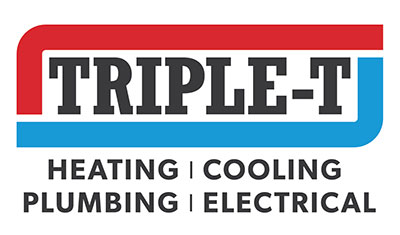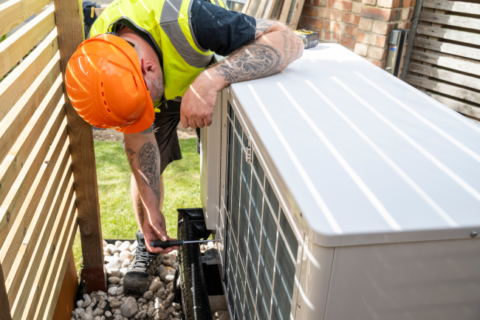6 Types of Heating & Cooling Systems Explained
The type of heating, ventilation and air conditioning (HVAC) system you install is an important decision for several reasons. First, it affects your utility bills. With heating and cooling accounting for over 50% of a household’s annual energy consumption, you stand to save a great deal by choosing the right equipment. HVAC systems are also responsible for your indoor comfort. A suitable setup is required to achieve adequate temperature and humidity control.
Whatever system you choose, expect your investment to last at least a decade, maybe twice that long with proper heating and cooling maintenance. By understanding the pros and cons of different HVAC equipment, you will be better prepared to make the ideal selection for your home and family.
Furnace & Air Conditioner
This traditional combination is the most common way to heat and cool a home in the US. It works by drawing in air from the interior, heating or cooling it, and distributing the conditioned air to each room via ductwork. This operating style is sometimes called “forced-air.” Furnaces can run on natural gas, oil, propane, or electricity, while air conditioners almost always run on electricity.
Furnace & Air Conditioner Pros
- Affordable purchase and installation price
- High-efficiency ratings for low operating costs
- Plenty of brand options and features
Furnace & Air Conditioner Cons
- Less comfortable heat from forced-air operation
- Risk of carbon monoxide poisoning and gas leaks from natural gas furnaces
- Ductwork required
Heat Pump
Air-source heat pumps comprise the fastest-growing segment of the residential HVAC market. If electricity is the only fuel source available, an electric heat pump is a more efficient option than an electric furnace. The equipment moves heat rather than generating it from a combustible fuel source. This allows for incredibly efficient performance, especially when the temperature is mild outside. Heat pumps also operate in reverse, providing central air conditioning in the summer.
Heat Pump Pros
- A single system for both heating and cooling
- High-efficiency ratings for low operating costs
- Compatible with solar panels or wind power
Heat Pump Cons
- Less comfortable heat from forced-air operation
- Less economical in cold climates
- Ductwork required
Furnace & Heat Pump
Also known as a hybrid or dual-fuel heating system, a furnace and heat pump combination provides the best of both worlds. During mild weather, the heat pump keeps your home comfortable with the lowest possible heating bills. Then, when the temperature dips below freezing, the gas-fired furnace provides supplemental heat. This prevents resorting to the less efficient electric resistance heater that normally serves as the backup heat source.
Furnace & Heat Pump Pros
- More efficient performance in mild weather than a furnace
- More efficient performance in cold weather than a heat pump alone
Furnace & Heat Pump Cons
- Less comfortable heat from forced-air operation
- More costly installation than a heat pump alone or a furnace and air conditioner combo
- Ductwork required
Ductless Mini-Split
The popularity of ductless mini-splits has grown substantially in recent years. These systems are a type of heat pump, able to provide year-round heating and cooling. The difference is the indoor, wall-mounted portion has a built-in air handler, eliminating the need for ductwork. Mini-splits can heat and cool a single room, such as a home add-on, or a single outdoor unit can connect to multiple indoor air handlers for whole-home comfort.
Ductless Mini-Split Pros
- High-efficiency ratings for low operating costs
- Zoned heating and cooling built into the system
- No ductwork required
- No heating and cooling loss from leaky air ducts
Ductless Mini-Split Cons
- Higher installation cost than traditional HVAC systems
- Cold-climate mini-split required in many places
- Repair costs can be higher
- Limited brands available
Boiler & Central Air Conditioner/Ductless Mini-Split
While more common in Europe than in the United States, boilers are a viable heating option. They deliver hot water or steam to radiators, baseboard heaters, or subfloor radiant heating systems. Gas and oil are the most popular fuel choices because electric boilers are costly to operate. Boilers can be combined with central air conditioners or ductless mini-splits, a decision largely dependent on whether the home has ductwork.
Boiler Pros
- Comfortable, even heating from the ground up
- No blowing air, which is good for allergy sufferers
- Combi boilers can provide domestic water heating
- No ductwork required
Boiler Cons
- More expensive than furnaces, heat pumps, or mini-splits
- Radiators or radiant floor pipes required
- Slow heating
Geothermal Heat Pump
Geothermal heat pumps are the most energy-efficient, environmentally friendly HVAC system available. Like air-source heat pumps, the system moves heat rather than converting it from a fuel source. The difference is it transfers heat to and from the ground rather than the outdoor air. Installation involves burying a matrix of pipes, called a loop, in the surrounding property. You must research local zoning ordinances and state and federal laws before installing this type of heating and cooling system.
Geothermal Heat Pump Pros
- Exceptional efficiency for the lowest possible operating costs
- Can connect to a hydronic system for duct-free radiant heating
- Long-term value with a lifespan of 25 to 50 years
Geothermal Heat Pump Cons
- High purchase and installation cost
- Potentially high maintenance and repair costs
- Requires ample surrounding land
Contact Our HVAC Service Experts in Utah County or Washington County
For more help choosing the best heating and cooling system for your Utah home, turn to the experts at Triple T Heating, Cooling & Plumbing. We draw on well over 40 years of experience to provide matchless customer satisfaction. Whether you need HVAC repair, installation, replacement, or maintenance, we’ve got you covered. Our HVAC services are second to none! To request a service estimate, please contact us at 801-790-0460 if you live in Utah County or at 435-216-1608 for Washington County residents.


